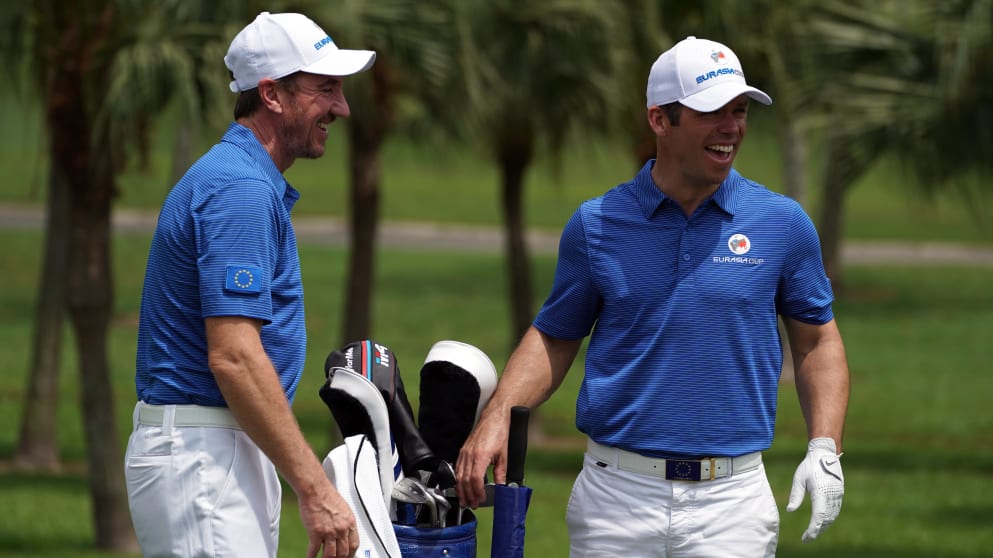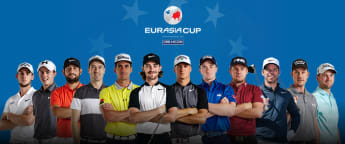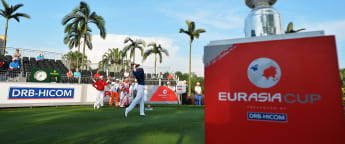We sat down with Europe’s skipper ahead of the third edition of the EurAsia Cup presented by DRB-HICOM to discuss the start of a very big week, and a very big year…

European Tour: Welcome back. How was your Christmas break?
THOMAS BJØRN:It was nice. It was a busy end to last year with a lot of travel and a lot of round the world stuff. So it was nice to be back home and get my thoughts together more than anything and realise that 2018 has finally come around. You know, when you're not in the year of the Ryder Cup happening, it can still feel like a long way to go. But now we are into the year itself. Obviously there's the EurAsia Cup first but then Ryder Cup will show up later. We're getting ever closer to the big thing.
ET: And time split between London and elsewhere?
TB: I was in Sweden for a very brief time in December and then I was in London for Christmas, and spent some nice time with my kids. I also had some nice time with Grace, so it's been good. I feel like Christmas was a busy schedule but a nice schedule, just doing my own things and getting things done in that respect. But now we're ready to go again.
ET: We're one week in the New Year, and here in Malaysia. What are your feelings ahead of the EurAsia Cup?
TB: It's great. I'm really looking forward to the week and spending some really good time with 12 very talented and very good players. We have a very good team, and it’ll be great just to spend some time in that environment. I spent a lot of time in the year that's gone being out on Tour and speaking to individuals and spending time with individuals.
Now I get to spend time with them as a group and see how they adapt to that kind of world, which is a bit different than what they are used to week in, week out. So, I'll learn a lot of things from the players this week, which I'm looking forward to. It's always a good, fun environment to be in when 12 guys get together as a team.

ET: You were here in 2014 as a player. What do you remember about that particular week?
TB: Well, it was the first one. It was a tournament that had to get off to a start. We had a very good team and Miguel was captain. We enjoyed the week, but it was a week of not really knowing what was ahead, too. I think any European team, and any European team I've been involved in, we always have those weeks where they become memorable for all the right reasons. That is spending time together and doing things together and working as a team. I just remember, it was a very good week. We didn't quite get the job done on Sunday but it was still a success. I very much realised that this event has a future that week. I thought it portrayed something that we all thought could be very good for the future, especially the relationship between the European Tour and the Asian Tour. I realised the event had a significant place that week. And it will keep growing and it will become an even stronger event for the future.
ET: Obviously you're wearing a different hat this week than that of a player. How do you view your own role this particular week?
TB: It goes back to what I said before. There are a couple of senior players in the team but there are also some youngsters, and a couple of those guys that, while most of them will have played team events as amateurs, but it's been a while for them and they haven’t done it in the professional arena. So it’ll be interesting to see how they react in a bit of a different environment.
My role is that of a captain and when you have that responsibility, that's the world that you live in. You've got to see how people adapt to team environments. We come from a very individual world of sport and it is a different thing entirely so it's good for me to see how they react and then try and talk to the players about what is different and what they can do different and what they shouldn't forget.
You know, the individuals makes them who they are, and it's easy to start focussing on the wrong things when you get into a team instead of making sure that you do your own thing and you play your own golf. But while they are who they are individually, we still come together as a team. I always found with European teams, the less you try and be a team, the better the team you are.

ET: You've talked before about taking something from each of the captains you've played under, but let's look forward. What type of captain are you going to be, do you think?
TB: Well, I feel that I have to be true to myself and who I am. I always feel with the players that I have a very personal relationship with them and very much on an even ground with them, and if I try and step away from being, you know, their friend and a person that they can talk to on a day to day basis and have really good, in depth conversations with them, then I'm not true to myself, so, I have to be that person.
I think as a captain, you sometimes want to make a little bit of a distance to them because you've got to make some tough decisions along the way, but I still feel I have to be true to myself, and that's also what the players would expect of me. I'm a person that they feel like they can spill everything that they have on their mind on to me, and then we'll work together.
So I think I'll have a captaincy that might be a little more closer to their lives without overstepping those boundaries of telling them what to do, because they are individual sportsmen. But having that close relationship with them where I'm the guy in the corner where they can come and put everything on, and then I'll help them as best as I can to try and find some solutions to whatever issues there are, and also try to form them into that environment of being part of a European team.
I don't want these guys to try to fit in with the team; I want them to be themselves.
I very much believe in carrying on what we are as a European Team and emphasising that European teams of the past have always stood together very closely without trying to make an effort to stand together closely. It's something that happens to us naturally. I don't want these guys to try to fit in with the team; I want them to be themselves and realise our continent, we come together very easily and we have a lot more things in common, and a lot more things in common than we sometimes realise. I think that always emerges in these team environments. I've never been part of a European team where I walk away feeling anything than that great team spirit. It came very naturally.
ET: How good is it to see some of Europe's top players here this week?
TB: I think it's amazing. It shows the commitment that they have. I wouldn't say I was surprised about some of them wanting to play, but it's a difficult time of year for a lot of guys in the sense that they are into their pre-season. They are into building for what they want to do for the year coming.
But the commitment they showed so early and the excitement has been admirable. There was no question about playing. They wanted to play. They wanted to represent Europe and they wanted to represent the Tour and themselves in this event. It was very telling about where European golf is. It's very telling about that the players have a very big commitment to this tournament, but to the Tour, as well. I'm very pleased with the 12 guys that we have here this week.

ET: Obviously a very important tournament in its own right, but what can you gain in terms of preparation for September from this week?
TB: Well, most likely a lot of players on this team, or quite a few of the players on this team, are going to be in Paris. So being here with them for a whole week and spending some different time with them is key. Yes, I can spend time with them on Tour, but there, they are very into their own commitments and what they want to do. When I spend time with them here, it's a bit of a different environment, and I have their ear a little bit better this week than I do week in, week out because I am their captain this week and I'm guiding the whole group to where we want to go.
So I get a little bit, I wouldn't say I get more response, but I get a little bit more intimate response from them in the sense that they interact with me and they come to me a bit more easily this week than on Tour, where I also have my own commitments. What we get here is quality time.
ET: What are your key elements for picking pairings friendships? Personalities? Game? Bit of everything?
TB: Well, it has to fit everything. A lot of people always say, “oh, it must be easier when everybody is playing.” Well, one of the hardest parts, I would say, having been involved in a lot of Ryder Cups as vice captain, is leaving somebody out. But it's also difficult to get pairings together when everybody is playing, because as soon as you move one, everything moves around because everybody has to play.
But you've got to combine all of the aspects you mentioned. It obviously helps if they have a game that suits each other. It helps if they get on well together. There's a lot of elements. And in an event like this, you know, you will have some where you tick all the boxes and then there will be some pairings where you might only tick a few of the boxes.
But that's okay, and one of the great things about team events is that you build relationships. You go to a team event and you also end up playing with a guy that you didn't necessarily think that you were going to play with, and you build a great relationship.
I think Rory [McIlroy] said it the best after the last Ryder Cup. He didn't think about the [Thomas] Pieters pairing, he didn't see that coming before he went into The Ryder Cup, but he ended up having a great pairing with him, and also, now, has a fantastic relationship with him off the course, too.
Relationships are built through these events, and I think that a very key message to the players is that you might play with somebody that you didn't think about coming into the week, but that it could end up being something that will build a playing relationship but also a personal relationship going forward.

ET: Ryder Cups, EurAsia Cups, Seve Trophies, what did you look for in a partner when you were playing?
TB: I think later in my playing career, I realised that I needed a partner who could do his own thing. I was never a one for arms around each other. The way I play the game, I need to focus on my own things, and I needed a partner that was very much similar to that, who would just go out and play golf and focus on what we do normally.
Some guys have the opposite relationship when they play in pairs and they feel like a pair becomes one. Like you always saw with Seve and Ollie; you felt like there was only one player on the golf course.
But every player in that sense is different. So, I always looked to have a partner who was very even keel with me, who had the same outlook on playing the game. I wouldn't say the same personality, because I don't know if there's that many that have my personality! But more in the sense of having the same outlook in the way you play the game.
ET: All things considered, what would you class as a success this week? Does it have to be a win or is there a bigger picture than that?
TB: I think the tournament in itself has earned the right for the success criteria to be nothing less than a win.
Yes, I'll learn a lot about a lot of things, win or lose. I'll learn a lot of things about myself. I'll learn a lot of things about the players. I'll learn a lot of things about the team element, and I'll take a lot of things away from here even if we were to lose.
And it’s not going to be easy. We are up against the strongest ever Asian Team, a very determined team and a team that are very hungry to win.
So, we've got to be on our best game and our best behaviour and best attitude to make sure that that happens.
But, no doubt, the criteria for success has to be to a win.










